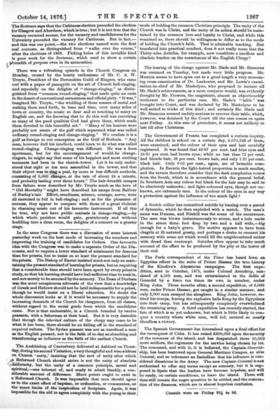The Archbishop of Canterbury delivered at Ashford on Thurs- day,
during his second Visitation, a very thoughtful and wise address on Church unity,' insisting that the sort of unity after which /.a Reformed Church should strive is not the unity of absolute :miformity, but the unity of a common principle, moral and apiritual,--one tolerant of, and ready to admit frankly, a con- siderable amount of difference. Moot points ought to exist in a Reformed Church. It was impossible that men should agree as to the exact effect of baptism, or ordination, or communion, or the exact limits of the inspiration of Scripture. Again, it was impossible for the old to agree completely with the young in their
mode of holding the common Christian principle. The unity of the Church was in Christ, and the unity of its action should be main- tained by the common love and loyalty to Christ, and while this remained so, there should be willingness to differ as to the mode of holding the Church's faith. That is admirable teaching. But translated into practical conduct, does it not really mean that the Thirty-nine Articles, for example, now constitute a needless and obsolete burden on the consciences of the English Clergy?


































 Previous page
Previous page